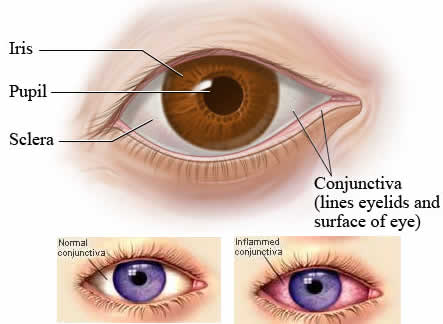The Link between Conjunctivitis and Psoriasis
Although the exact cause of psoriasis is not fully understood yet, but many experts believe that the immune system abnormality may play a key role behind the problem. And there are some complications related to the disease, one of them is inflammatory eye problems such as conjunctivitis, also familiar called as pink eye or red eye.
It is a kind of skin problem (a chronic /lifelong condition) that can causes cells of your skin to grow faster than normal, resulting in silvery, red, or white – thick patches of skin.
Your skin has its own life cycle to keep healthy. Normally, the cells of skin gradually grow and move to the skin surface which then eventually will replace the old cells. This process can take about a month (4 weeks).
 But in psoriasis, without known reason the skin cells grow so rapidly. They can move to the outermost layer of the skin in days rather than in weeks. As a result, they build up and cause thick patches on the outermost layer of the skin.
But in psoriasis, without known reason the skin cells grow so rapidly. They can move to the outermost layer of the skin in days rather than in weeks. As a result, they build up and cause thick patches on the outermost layer of the skin.
The good news, it cannot spread to others (it is not contagious)! But the problem comes when the disease is poorly controlled. While the symptoms of the disease during flares can be very bothersome, some serious complications from the disease also should be concerned as well.
Psoriatic arthritis is a common complication of psoriasis. Like most things in arthritis, it can cause joint damage. Even in severe case, it may cause a loss of function in some joints that can lead to disability.
Other complications include eye problems (such as uveitis, conjunctivitis, and blepharitis), hypertension, type-2 diabetes, obesity, cardiovascular diseases, metabolic syndrome, kidney problem, Parkinson’s disease, and other autoimmune diseases.
The complications of psoriasis is not only physiological problems, it also can increase the risk of some psychological problems such as depression, anxiety, or social isolation.
Conjunctivitis is an eye problem in which the conjunctiva (transparent /clear membrane that lines the inside of your eyelid and lays over the white part of your eyeball) is inflamed or infected.
When the clear tissues of conjunctiva become infected /inflamed, they can be visible – causing pinkeye or redeye.
*Image credit to ‘Web Md and Health Wise’
For summary, the symptoms of the problem can include:
- Red or pink eye.
- The color change of white eyeball may also be followed with itchiness.
- A discharge in the effected eye. Typically, it forms a crust when you sleep, preventing your eye to become difficult from opening when you wake up from your sleep in the morning.
- You may also experience a gritty feeling – increased sensitivity to light and blurred vision in the affected eye
- And the problem can affect one or both eyes.
There are some causes that can lead to inflamed conjunctiva, these include:
- A contact with any substances that can lead to irritation to conjunctiva. Some of these substances are a loose eyelash when you rub your eye, irritation triggered by shampoo, a chemical splash in your eye, and a contact with chlorinated water.
- An infection triggered by bacteria or virus.
- A contact with allergens (such as dust mites or pollen) that causes an allergic reaction.
How about psoriasis, can it have an effect in increasing your risk of having this eye problem?
Although some experts still believe that psoriasis is a merely skin problem, but in fact many psoriasis sufferers experience complications that are not related to their skin.
It’s still debatable whether psoriasis can cause excess inflammation to other organs of the body (such as some blood vessels in eyes). But some studies found that the disease may be more than skin deep.




